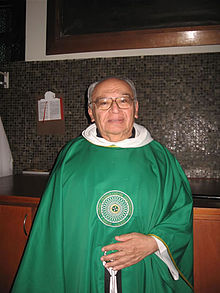Lima (Peru), 1928
By Heraclio Bonilla
One of the main Latin American theologians and one of the leading figures of Liberation Theology, Gustavo Gutiérrez entered, in 1947, the National University of San Marcos (UNMSM), where he studied medicine for four years. At the same time, he studied Humanities at the Pontifical Catholic University of Peru. During those years, he participated as a layperson in Catholic Action. From 1951 to 1955, he studied philosophy and psychology at the Catholic University of Louvain (Belgium) and graduated in psychology. From 1955 to 1959, he studied theology at the Catholic University of Lyon (France) — where in 1985 he would obtain his doctorate in theology — and from 1959 to 1960 at the Gregorian University in Rome. Between 1962 and 1963, he studied at the Institut Catholique in Paris.
Gutiérrez was ordained a priest in 1959. The following year, upon returning to Peru, he became an advisor to the National Union of Catholic Students (UNEC), which later gave rise to the Movement of Catholic Professionals, both linked to the international Catholic student and intellectual movement Pax Romana. Also in 1960, he began teaching at the Pontifical Catholic University, where he became a full professor in the Department of Theology. His courses in the Faculty of Humanities and later in the Faculty of Social Sciences established a dialogue between Christian faith and contemporary thought. In the early 1960s, he attended the Second Vatican Council as theological advisor to Monsignor Manuel Larraín of Chile. Later, he participated in the preparations of various departments of the Latin American Episcopal Council (CELAM), including the Second General Conference of the Latin American Episcopate, in Medellín (Colombia), in 1968, where he attended as a theological expert. From 1967 to 1979, he was a member of CELAM’s Theological Reflection Team, and from 1968 to 1980, he was part of the Theological Reflection Team of the Peruvian Episcopal Conference. In 1979, he also served as an advisor to several Latin American bishops at the Second General Conference of the Latin American Episcopate in Puebla (Mexico).
Decisive decade
The 1970s were one of the defining moments of his journey. In addition to his teaching duties and collaboration with the ecclesiastical hierarchy, Gutiérrez founded in 1974, with a small team, the Bartolomé de Las Casas Institute. At the same time, he served as associate pastor of the San Francisco de Paula parish in Rímac, a working-class district of Lima, where he was responsible for the Cristo Redentor chapel. His daily relationship with the residents of this poor and neglected neighborhood constantly confronted him with the meaning of his pastoral and theological work.
In fact, Gutiérrez is not a desk theologian, but rather a person passionately and tirelessly committed. His closeness to the daily life of many men and women, especially the children of his parish in Rímac, and his attentive listening to the cry of these people constituted the source that nourished his spirituality and theology. Rightly, E. Schillebeeckx, one of the most important theologians of the 20th century, said of Gutiérrez: “his methodology is his spirituality.” Indeed, theology and spirituality, theology and life are inseparable in the work of the Peruvian thinker.
His most prominent works, Teología de la Liberación (1971), Beber en su propio pozo, Hablar de Dios desde el sufrimiento del inocente (1986), El Dios de la vida (1989), En la busca de los pobres de Jesucristo (1992), left a deep mark on theological practice, not only in Peru but also in Latin America and worldwide. A theology lived and thought from the so-called “periphery” became present and opened horizons and multiple efforts to live and think the faith in Jesus Christ from the perspective of the poor, the “insignificant,” the “non-persons.” Liberation Theology assumes that the history of salvation occurs within the same history; there is no separate sacred history and human history. Its method consists in understanding theology as a second act because the first is human practice or action. Thus, theology is a reflection of faith based on the events of life, on the presence or absence of God’s love. This reflection has an integral character since it includes social, economic, human, and religious dimensions.
Dominican
Gutiérrez is a professor of theology at the University of Notre Dame, Indiana, in the United States. He is also a member of the editorial boards of the journals Concilium (Netherlands) and Paginas (Peru), of the Ecumenical Association of Third World Theologians (EATWOT), and of the Advisory Committee of the Center for Studies and Publications, which published his main works. At the end of 1998, he joined the Dominican Order in France, with which he had strong ties since his student years in Lyon and which offered him a suitable space for the development of his theological work. Several of his works are inspired by the thought of the Dominican friar Bartolomé de Las Casas, defender of the Indigenous peoples in the 16th century.
He was received by Pope Benedict XVI in 2007 and by Pope Francis in 2013. He received an honorary doctorate in Theology from Yale University. In 2015, he was living in the Dominican convent in Lima, Peru, where he was dedicated to writing a book about “the option for the poor.”



